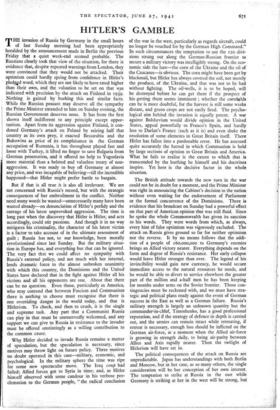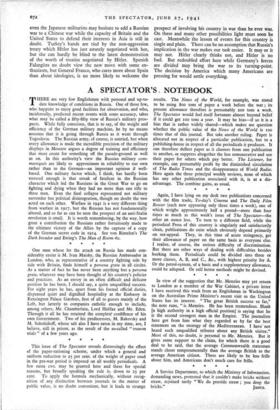HITLER'S GAMBLE
THE invasion of Russia by Germany in the small hours of last Sunday morning had been appropriately heralded by the announcement made in Berlin the previous Friday that a quiet week-end seemed probable. The Russians clearly took that view of the situation, for there is evidence that, despite repeated warnings from London, they were convinced that they would not be attacked. Their optimism could hardly spring from confidence in Hitler's pledged word, which they are not likely to have rated higher than their own, and the valuation to be set on that was indicated with precision by the attack on Finland in 1939.. Nothing is gained by burking this and similar facts. While the Russian peasant may deserve all the sympathy the Prime Minister extended to him on Sunday evening, the Russian Government deserves none. It has from the first shown itself indifferent to any principle except oppor- tunism. Apart from its aggression against Finland, it con- doned Germany's attack on Poland by seizing half that country as its own prey, it exacted Bessarabia and the Bukowina as price of its complaisance in the German occupation of Rumania, it has throughout played fast and loose with Turkey, it lifted no finger to save Bulgaria from German penetration, and it offered no help to Yugoslavia more material than a belated and valueless treaty of non- aggression. It was ready to buy off Germany at almost any price, and was incapable of believing—till the incredible happened—that Hitler might prefer battle to bargain.
But if that is all true it is also all irrelevant. We are not concerned with Russia's record, but with the strategic consequences of her embroilment in the conflict. Neither need many words be wasted—unnecessarily many have been wasted already—on denunciation of Hitler's perfidy and the outrage of his latest unprovoked aggression. The time is long past when the discovery that Hitler is Hitler, and acts accordingly, could stir passions. And though it in no way mitigates his criminality, the character of his latest victim is a factor to take account of in the ultimate assessment of guilt ; Russia has not, to our knowledge, been morally revolutionised since last Sunday. But the military situa- tion in Europe has, and everything but that can be ignored. The very fact that we could affect no sympathy with Russia's external policy, and not much with her internal, lends dramatic force to the almost unbroken unanimity with which this country, the Dominions and the United States have declared that in the fight against Hitler all his victims and all his opponents are one. About that there can be no question. Even those, particularly in America, who may contend that between Fascism and Communism there is nothing to choose must recognise that there is one overriding danger in the world today, and that is Hitlerism. To check, and then to crush, it is the single and supreme task. Any part that a Communist Russia can play in that must be unreservedly welcomed, and any support we can give to Russia in resistance to the invader must be offered unstintingly as a willing contribution to the common cause.
Why Hitler decided to invade Russia remains a matter of speculation, but the speculation is necessary, since motives may throw light on future policy. Three motives no doubt operated in this case—military, economic, and psychological. In the military sphere the time was ripe for some new spectacular move. The Iraq coup had failed; Allied forces got to Syria in time; and, as Hitler himself observed with some candour in his verbose pro- clamation to the German people, " the radical conclusion of the war in the west, particularly as regards aircraft, could no longer be vouched for by the German High Command." In such circumstances the temptation to use the 120 divi- sions strung out along the German-Russian frontier to secure a military victory was intelligibly strong. On the eco- nomic side the lure—the corn of the Ukraine and the oil of the Caucasus—is obvious. The corn might have been got by blackmail, but Hitler has always coveted the soil, not merely the produce, of the Ukraine, and that was not to be had without fighting. The oil-wells, it is to be hoped, will be destroyed before he can get them if the prospect of his getting them seems imminent ; whether the cornfields can be is more doubtful, for the harvest is still some weeks distant, and green crops are not easily fired. The psycho-• logical aim behind the invasion is equally patent. A war against Bolshevism would divide opinion in the United States, appeal powerfully to Franco's Spain, and hardly less to Darlan's France (such as it is) and even shake the resolution of some elements in Great Britain itself. There Hitler has fallen into a pardonable error. He has assessed quite accurately the hatred in which Communism is held by large sections of opinion in Great Britain and America. What he fails to realise is the extent to which that is transcended by the loathing he himself and his doctrines inspire. Yet here is the decisive factor in the whole situation.
The British attitude towards the new turn in the war could not be in doubt for a moment, and the Prime Minister was right in announcing the Cabinet's decision to the nation without even waiting for the endorsement of Parliament or the formal concurrence of the Dominions. There is evidence that his broadcast on Sunday had a powerful effect on that part of American opinion that was still fluid. Since he spoke the whole Commonwealth has given its sanction to his words. They were words from which, as always, every hint of false optimism was vigorously excluded. The attack on Russia gives ground so far for neither optimism nor the reverse. It by no means follows that the addi- tion of a people of i6o,000,000 to Germany's enemies brings an Allied victory nearer. Everything depends on the form and degree of Russia's resistance. Her early collapse would leave Hitler stronger than ever. The legend of his invincibility would gain new currency, he would secure immediate access to the natural resources he needs, and he would be able to divert to service elsewhere the greater part of the million and a-half men he has been keeping for months under arms on the Soviet frontier. Those con- tingencies must be reckoned with, and we must have stra- tegic and political plans ready against the event of German success in the East as well as a German failure. Russia's military strength is largely an unknown quantity but the commander-in-chief, Timoshenko, has a good professional reputation, and if the strategy of defence in depth is carried out, and the armies can remain intact while retreating, if retreat is necessary, enough loss should be inflicted on the German air-force, at a moment when the Allied air-force is growing in strength daily, to bring air-parity between Allies and Axis rapidly nearer. Then the twilight of Hitlerism will have set in.
The political consequences of the attack on Russia are unpredictable. Japan has understandings with both Berlin and Moscow, but in her case, as so many others, the single consideration will be her conception of her own interest. The temptation to strike at Russia in the east while Germany is striking at her in the west will be strong, but even the Japanese militarists may hesitate to add a Russian war to a Chinese war while the capacity of Britain and the United States to defend their interests in Asia is still in doubt. Turkey's hands are tied by the non-aggression treaty which Hitler has just astutely negotiated with her, but she can hardly be blind to the latest demonstration of the worth of treaties negotiated by Hitler. Spanish Falangists no doubt view the new move with some en- thusiasm, but General Franco, who cares more about Spain than about ideologies, is no more likely to welcome the prospect of involving his country in war than he ever was. On these and many other possibilities light must soon be cast. Meanwhile the lesson of events for this country is single and plain. There can be no assumption that Russia's implication in the war makes our task easier. It may or it may not. Hitler clearly thinks not, and Hitler is no fool. But redoubled effort here while Germany's forces are divided may bring the war to its turning-point. The decision by America which many Americans are pressing for would settle everything.























 Previous page
Previous page